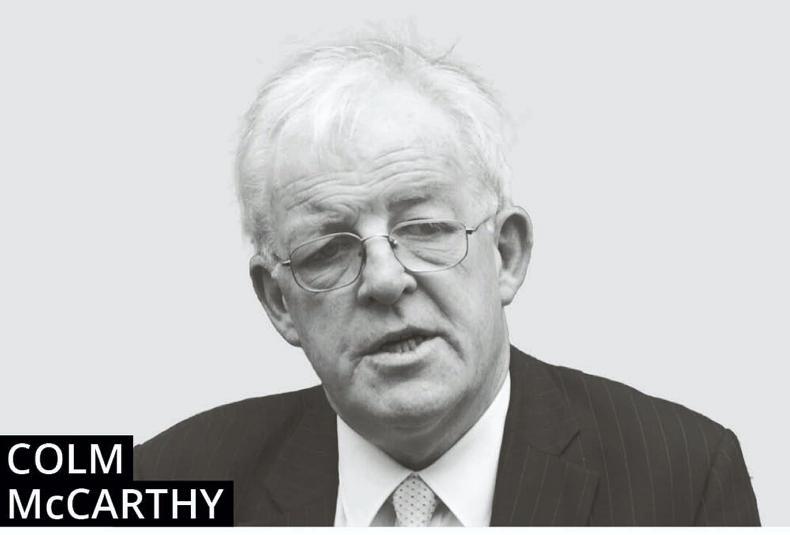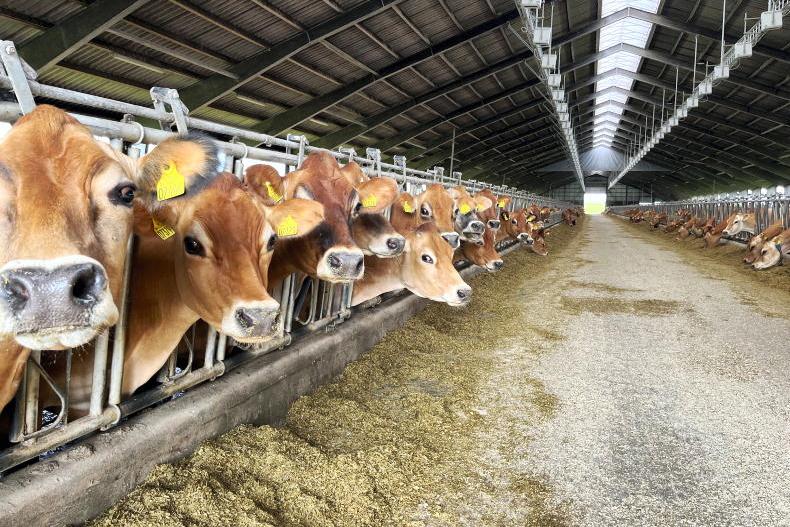The pressure on Irish farming to reduce carbon emissions from the livestock sector has its origin in a feature of international climate change policy that gets little attention. Should each country in the world be expected to cut its carbon emissions? Since global emissions, the scientists tell us, must be stabilised and eventually reduced to avoid damaging climate change, the obvious answer appears to be yes.
So the EU has set targets for its 28 member states and the 2015 Paris Accord sought to extend this approach worldwide. But since individual countries do not have an atmosphere, it does not matter where emissions occur; all that matters is that global emissions are contained.
Equal
The health of the earth’s atmosphere is a global public good and climate change a risk to all. Every tonne of carbon, wherever emitted, contributes equally. Nothing is achieved if, for example, world production of steel shifts entirely to China and all the European countries manage to cut emissions through importing steel. Their reduced emissions would be entirely offset by the rise in Chinese emissions.
It is world demand for carbon-emitting goods and services that matters, not the location of production.
Carbon content
The simple economics point to a globally adopted tax on all products which reflects their carbon content, calibrated to reduce demand to whatever level is consistent with containing climate risks.
The international production pattern would be dictated by overall costs and nobody would bother about country-by-country emission targets.
there has never been much enthusiasm for a coordinated carbon tax approach
The tax would discourage global demand for carbon-intensive products and production would locate wherever it was most economic to do so.
Unfortunately there are roughly 200 countries sharing the world’s atmosphere, all jealous to guard their sovereignty, and there has never been much enthusiasm for a coordinated carbon tax approach.
Transport
The problem with country-by-country emission targets is not just the impossibility of enforcement: it is the absence of any rational way to arrive at sensible targets. The transport sector is a perfect example. In most European countries there are heavy taxes on fuels used in road transport, both to discourage emissions and to extract from road users the funds needed for road construction and maintenance.
The retail price of petrol and road diesel in virtually all European countries is marked up by at least 100%
The retail price of petrol and road diesel in virtually all European countries is marked up by at least 100% over the ex-refinery price through excise taxes and VAT. But in the United States, the taxes add only about 15% and there are several countries, often oil producers, where there are subsidies – petrol at the pump actually costs less than the ex-refinery price.
There are purchase taxes on road vehicles in Ireland, as well as annual taxes, on top of the steep fuel taxes. So there is already substantial discouragement to road transport emissions coming from the tax system. Lower-hanging fruit is available elsewhere and the relentless focus on emissions from this form of transport is a peculiarly European obsession.
Within the transport sector there are no taxes on either aviation or maritime transport, which produce substantial emissions worldwide. The exemption of these sectors from tax is a kind of historical accident.
International agreements were arrived at, some as long ago as the 1940s, banning the taxation of jet kerosene and of marine diesel long before there were concerns about climate change. As a result, jet fuel and marine diesel, per litre, is normally only about 40% of the price you pay at the pump for petrol or road diesel. But every litre used in planes and ships makes roughly the same contribution to the emissions total as the fuel you burn in your car.
the pressure is on to reduce livestock emissions in countries which are exceeding their targets. Ireland is one of these, for reasons which have nothing to do with farming
The absence of a globalised approach to the taxation of carbon emissions has unfortunate consequences for agriculture. Nobody disputes that grazing livestock produce substantial emissions. Since there are national targets in the EU, the pressure is on to reduce livestock emissions in countries which are exceeding their targets. Ireland is one of these, for reasons which have nothing to do with farming. The imposition of extra production costs on Irish agriculture, with activity shifting to whatever EU countries happen to be below their (entirely arbitrary) emission targets achieves nothing – it is less rational than shifting steel production to China, which may well be the overall low-cost producer.
Ireland is one of the European countries which enjoys favourable costs in dairying, for example. It makes better economic sense to devise a system which encourages production, whether of steel or milk, in those parts of the world which offer cost advantages, assigning emission reduction to demand-side measures.
Read more
Colm McCarthy: UK vagueness over Brexit strategy is running out of room
New suckler report to cut costs and carbon
Ag without animals a non runner - US study
The great carbon debate: Suckler cows and jumbo jets
The pressure on Irish farming to reduce carbon emissions from the livestock sector has its origin in a feature of international climate change policy that gets little attention. Should each country in the world be expected to cut its carbon emissions? Since global emissions, the scientists tell us, must be stabilised and eventually reduced to avoid damaging climate change, the obvious answer appears to be yes.
So the EU has set targets for its 28 member states and the 2015 Paris Accord sought to extend this approach worldwide. But since individual countries do not have an atmosphere, it does not matter where emissions occur; all that matters is that global emissions are contained.
Equal
The health of the earth’s atmosphere is a global public good and climate change a risk to all. Every tonne of carbon, wherever emitted, contributes equally. Nothing is achieved if, for example, world production of steel shifts entirely to China and all the European countries manage to cut emissions through importing steel. Their reduced emissions would be entirely offset by the rise in Chinese emissions.
It is world demand for carbon-emitting goods and services that matters, not the location of production.
Carbon content
The simple economics point to a globally adopted tax on all products which reflects their carbon content, calibrated to reduce demand to whatever level is consistent with containing climate risks.
The international production pattern would be dictated by overall costs and nobody would bother about country-by-country emission targets.
there has never been much enthusiasm for a coordinated carbon tax approach
The tax would discourage global demand for carbon-intensive products and production would locate wherever it was most economic to do so.
Unfortunately there are roughly 200 countries sharing the world’s atmosphere, all jealous to guard their sovereignty, and there has never been much enthusiasm for a coordinated carbon tax approach.
Transport
The problem with country-by-country emission targets is not just the impossibility of enforcement: it is the absence of any rational way to arrive at sensible targets. The transport sector is a perfect example. In most European countries there are heavy taxes on fuels used in road transport, both to discourage emissions and to extract from road users the funds needed for road construction and maintenance.
The retail price of petrol and road diesel in virtually all European countries is marked up by at least 100%
The retail price of petrol and road diesel in virtually all European countries is marked up by at least 100% over the ex-refinery price through excise taxes and VAT. But in the United States, the taxes add only about 15% and there are several countries, often oil producers, where there are subsidies – petrol at the pump actually costs less than the ex-refinery price.
There are purchase taxes on road vehicles in Ireland, as well as annual taxes, on top of the steep fuel taxes. So there is already substantial discouragement to road transport emissions coming from the tax system. Lower-hanging fruit is available elsewhere and the relentless focus on emissions from this form of transport is a peculiarly European obsession.
Within the transport sector there are no taxes on either aviation or maritime transport, which produce substantial emissions worldwide. The exemption of these sectors from tax is a kind of historical accident.
International agreements were arrived at, some as long ago as the 1940s, banning the taxation of jet kerosene and of marine diesel long before there were concerns about climate change. As a result, jet fuel and marine diesel, per litre, is normally only about 40% of the price you pay at the pump for petrol or road diesel. But every litre used in planes and ships makes roughly the same contribution to the emissions total as the fuel you burn in your car.
the pressure is on to reduce livestock emissions in countries which are exceeding their targets. Ireland is one of these, for reasons which have nothing to do with farming
The absence of a globalised approach to the taxation of carbon emissions has unfortunate consequences for agriculture. Nobody disputes that grazing livestock produce substantial emissions. Since there are national targets in the EU, the pressure is on to reduce livestock emissions in countries which are exceeding their targets. Ireland is one of these, for reasons which have nothing to do with farming. The imposition of extra production costs on Irish agriculture, with activity shifting to whatever EU countries happen to be below their (entirely arbitrary) emission targets achieves nothing – it is less rational than shifting steel production to China, which may well be the overall low-cost producer.
Ireland is one of the European countries which enjoys favourable costs in dairying, for example. It makes better economic sense to devise a system which encourages production, whether of steel or milk, in those parts of the world which offer cost advantages, assigning emission reduction to demand-side measures.
Read more
Colm McCarthy: UK vagueness over Brexit strategy is running out of room
New suckler report to cut costs and carbon
Ag without animals a non runner - US study
The great carbon debate: Suckler cows and jumbo jets









SHARING OPTIONS